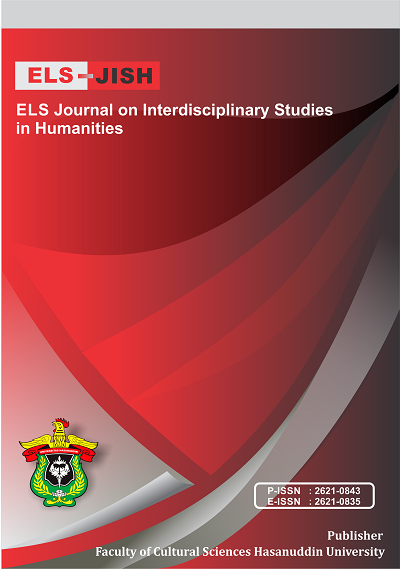The Implementation of POE (Predict, Observe, Explain) Learning Model to Improve Students’ Achievement at Class XI Students of SMA Negeri 10 Makassar
DOI:
https://doi.org/10.34050/elsjish.v3i4.11891Keywords:
POE (Predict,Observe,Explain), Learning Model, AchievementAbstract
This study aimed to determine the implementation of POE (predict, observe, explain) learning model to improve students’ achievement at class XI students of SMA Negeri 10 Makassar. This type of research was classroom action research consisting of two cycles. Each cycle of classroom action research was carried out in four (4) stages, namely: planning, implementing,observing, and reflecting. The subjects in this study were 35 class XI students in SMA Negeri 10 Makassar. The result of research indicated that there were 6 students (68.85%) in cycle I and 33 students (94.28%) in cycle II that achieved minimum completeness criteria. This research can be concluded that POE learning model can develop students ideas by relating experiences or stories that have been obtained previously. Besides, students' creativity in using diction is very good when presenting the prediction results using the POE method. Thus it is necessary to develop a learning model in the teaching and learning process so that students know very well the meaning of the assessment process of various learning activities.
References
Aqib, Z. (2009). Penelitian Tindakan Kelas. Bandung: Yrama Widya.
Atriyanti, Y ; Hadisaputro, S. (2015). Chemistry in Education. School Science and Mathematics, 2(3), 133–139. https://doi.org/10.1111/j.1949-8594.1902.tb00418.x
Ayvaci, H. S. (2013). Investigating The Effectiveness of Predict-Observe-Explain Strategy on Teaching Photo Electricity Topic. Journal of Baltic Science Education, 548–564.
Farida, D., Waluyo, J., & Fikri, K. (2018). The Effect of POE Learning Models (Prediction, Observation, and Explanation) with Probing-Prompting Techniques on The Student’s Cognitive Learning Outcomes of SMA Muhammadiyah 3 Jember. Pancaran Pendidikan, 7(3), 51–56. https://doi.org/10.25037/pancaran.v7i3.199
Fathonah, F. S. (2017). Penerapan Model Poe (Predict-Observe-Explain) Untuk Meningkatkan Keterampilan Membaca Pemahaman Siswa Kelas Iv Sekolah Dasar. Jurnal Pendidikan Guru Sekolah Dasar, 1(1), 171–178. https://doi.org/10.17509/jpgsd.v1i1.9070
Fatwadi, A., Gummah, S., & Prasetya, D. S. B. (2019). Implementation of POE Learning Model with Worksheets Assistance to Improve Students’ Activities and Learning Outcomes. Lensa : Jurnal Kependidikan Fisika, 7(1), 10. https://doi.org/10.33394/j-lkf.v7i1.1907
Hsiao, H. S., Chen, J. C., Hong, J. C., Chen, P. H., Lu, C. C., & Chen, S. Y. (2017). A five-stage prediction- observation-explanation inquiry-based learning model to improve students’ learning performance in science courses. Eurasia Journal of Mathematics, Science and Technology Education, 13(7), 3393–3416. https://doi.org/https://doi.org/10.12973/eurasia.2017.00735a
Junaidi, J., Hamuddin, B., Simangunsong, W., Rahman, F., & Derin, T. (2020). ICT usage in teaching English in Pekanbaru: Exploring junior high school teachers’ problems. International Journal of Advanced Science and Technology, 29(3), 5052-5063.
Restami, M. P., Suma, K., & Pujani, M. (2013). Pengaruh Model Pembelajaran Poe ( Predict-Observe- Explaint ) Terhadap Pemahaman Konsep Fisika Dan Sikap Program Studi Pendidikan Sains , Program Pasca Sarjana. E-Journal Program Pascasarjana Universitas Pendidikan Ganesha, 3, 1–11.
Rini, A. P., Suryani, N., & Fadhilah, S. S. (2018). Development of the Predict Observe Explain (POE)-based Thematic Teaching Materials. International Journal of Educational Research Review, 4(1), 1–7. Retrieved from https: //doi.org/10.24331/ijere.458067%0A
Rosdianto, H., Murdani, E., & Hendra. (2017). Implementasi Model Pembelajaran POE (Predict Observe Explain) untuk Meningkatkan Pemahaman Konsep Siswa pada Materi Hukum Newton. Jurnal Pendidikan Fisika, 6(1), 55–59.
Sari, A. T. W. & Alarifin, D. H. (2016). Pengembangan modul berbasis POE (Predict, Observe, Explain) Materi Usaha dan Energi Ditinjau Dari Kemampuan Kognitif. Jurnal Pendidikan Fisika, 4(2), 124–136.
Setyadi, I. M. A., Sudiarta, I. G. P., & Mertasari, N. M. S. (2019). The effect of predict-observe-explain ( POE ) learning model using open- ended problem ( OEP ) towards students ’ mathematical problem solving skill. Jurnal Pendidikan Dan Pengajaran, 52(3), 133–144.
Sujarwo, et al. (2019). The Application of Problem Solving Reasoning (PSR) in Improving Students’ Metacognitive at the Twelfth Grade Students of SMAN 19 Makassar. nternational Journal for Educational and Vocational Studies Vol. 1, No. 2, June 2019, pp. 138-141 Available online at http://ojs.unimal.ac.id/index.php/ijevs.DOI:https://doi.org/10.29103/ijevs.v1i2.1525
Suryamiati, W., Kahar, A. P., & Setiadi, A. E. (2019). Improving higher-order thingking skill through POE (Predict, Observe, Explain) and guided discovery learning models. Jurnal Pendidikan Biologi Indonesia, 5(2), 245–252. https://doi.org/10.22219/jpbi.v5i2.8266
Wulandari, T. A., Prihandono, T., & Maryani. (2018). Analisis Miskonsepsi Siswa pada Materi Suhu dan Kalor di Kelas XI SMA Jember. Inovasi Pendidikan Fisika, 3(1), 434–439. Retrieved from http://ejournal.radenintan.ac.id/index.php/IJSME/article/view/2470.
Yulianti, S. H., Juanengsih, N., & Mardiati, Y. (2018). POE learning model: The effect on student process on the coordination system concept. JPPS (Jurnal Penelitian Pendidikan Sains ), 8(7). Retrieved from https://journal.unesa.ac.id/index.php/jpps/article/view/3858/2188
Downloads
Published
Issue
Section
License

This work is licensed under a Creative Commons Attribution-NonCommercial 4.0 International License.






